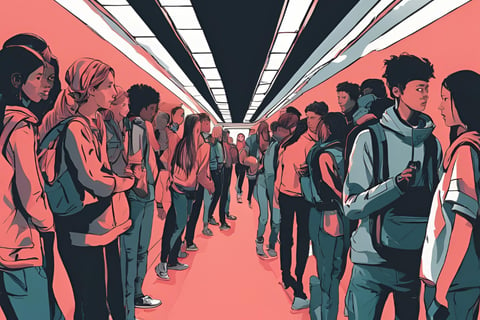The Shocking Truth About Teen Life in School: You Won't Believe What's Really Going On
Teenage problems in school are a complex blend of emotional, social, and academic challenges. These formative years play a significant role in shaping a person’s future, making it vital to address these issues with care and understanding. By fostering a collaborative approach involving parents, teachers, and peers, we can create an environment where teenagers not only survive but thrive.
SELF-HELP
Kanav Pareek
1/28/20257 min read


Teenage years are a whirlwind of emotions, growth, and discovery. This phase of life is characterized by a unique blend of independence and responsibility, making it both exciting and challenging. For many teenagers, school serves as the epicenter of their lives, but it also becomes the breeding ground for several issues that can shape their development. From academic stress to social dynamics, the struggles teenagers face during this time often feel overwhelming.
Academic Pressure
The pressure to perform well academically is a significant challenge for teenagers.
Causes of Academic Stress
One of the main reasons for academic stress is the intense competition among peers. With the growing emphasis on grades and rankings, students often feel compelled to outperform their classmates. Additionally, parental expectations further add to this burden, as parents often equate academic success with future opportunities, leaving teenagers feeling inadequate if they fail to meet these standards.
Effects on Mental Health
The effects of academic pressure can be far-reaching. Anxiety, burnout, and a constant sense of fear are common among students dealing with excessive workload and expectations. This stress not only impacts their mental well-being but also hampers their sleep and concentration, creating a vicious cycle of underperformance and self-doubt.
Bullying in Schools
Bullying remains one of the most pressing issues faced by teenagers in school settings.
Types of Bullying
Bullying comes in various forms, including physical aggression, verbal taunts, and exclusion from social groups. In recent years, cyberbullying has emerged as a significant problem, with students being targeted online, often anonymously. This type of bullying can be particularly damaging as it invades the victim's personal space and is difficult to escape.
Consequences of Bullying
The emotional toll of bullying is profound. Victims often experience low self-esteem, social withdrawal, and even depression. In severe cases, bullying can lead to long-term psychological scars that hinder personal and professional growth.


Peer Pressure
Peer pressure is another significant challenge teenagers encounter in school, often influencing their behavior and decision-making.
Social Conformity
Teenagers feel a strong urge to fit in with their peers, which can lead them to adopt habits or behaviors they may not be comfortable with. This includes experimenting with substances like alcohol or drugs, engaging in risky behavior, or participating in activities against their better judgment—all to avoid being excluded or ridiculed by their friends.
Handling Peer Pressure
Building self-confidence is the key to resisting peer pressure. Schools and parents can empower teenagers by encouraging them to trust their instincts and make decisions aligned with their values. Creating a support system, including trusted adults and friends, can help students navigate challenging social situations.
Mental Health Struggles
Mental health is a growing concern among teenagers, often exacerbated by the pressures of school life.
Signs of Poor Mental Health
Teenagers struggling with mental health issues may show signs like withdrawal from activities they once enjoyed, difficulty concentrating, and drastic changes in behavior or mood. Persistent feelings of sadness or anxiety are red flags that need immediate attention.
Addressing Mental Health in Schools
Schools can play a pivotal role in addressing mental health issues. Employing trained counselors, fostering an open dialogue about mental health, and creating safe spaces where students feel heard are essential. Awareness programs and mental health workshops can also help normalize seeking support.
Time Management Challenges
Balancing schoolwork, extracurricular activities, and personal life can be overwhelming for teenagers.
Overwhelming Schedules
The typical day of a teenager is often packed with classes, sports, homework, and social obligations. This jam-packed schedule can lead to exhaustion and reduced productivity, leaving little time for relaxation or hobbies.
Strategies for Better Time Management
Teaching teenagers effective time management techniques can alleviate this issue. Encouraging them to prioritize tasks, use planners or apps, and set realistic goals can make a world of difference. Learning to say no to non-essential commitments is another valuable skill.
Social Media and Its Impact
Social media is a double-edged sword for teenagers, offering connectivity but also posing significant risks.
The Digital Distraction
With hours spent scrolling through social media platforms, teenagers often struggle to focus on studies and meaningful relationships. This constant engagement with digital platforms can lead to procrastination and a loss of productivity.
Comparing Lives Online
Social media often portrays an unrealistic picture of life, leading teenagers to compare their lives unfavorably with others. This can result in feelings of inadequacy and lower self-esteem, further complicating their emotional well-being.


Identity and Self-Esteem Issues
Teenage years are a critical time for self-discovery, but they can also be fraught with challenges related to self-esteem and identity.
Body Image Concerns
The media, coupled with social media influencers, often promotes unrealistic beauty standards. Teenagers, influenced by these images, may develop insecurities about their appearance. Issues like body shaming or an obsession with achieving a certain look can negatively impact their self-confidence and lead to eating disorders or other health problems.
Struggles with Personal Identity
Teenagers often grapple with questions about who they are and their place in the world. Societal expectations, peer influence, and family pressures can create confusion and stress. Exploring their individuality while adhering to societal norms becomes a delicate balancing act.
Teacher-Student Relationships
The dynamics between teachers and students play a crucial role in shaping a teenager’s experience in school.
Miscommunication and Lack of Understanding
Conflicts between teachers and students often arise from misunderstandings or a lack of empathy. Strict discipline, unfair treatment, or a failure to recognize individual learning needs can create a sense of alienation among students.
Building Healthy Relationships
Encouraging mutual respect and open communication can help foster a positive teacher-student relationship. Teachers who take the time to understand their students’ perspectives and needs can create a more supportive and nurturing learning environment.
Family and Cultural Expectations
Family and cultural values can heavily influence a teenager’s life and school experience.
The Role of Family Dynamics
Parents often have high expectations for their children’s academic and extracurricular achievements. While these expectations stem from a place of care, they can inadvertently add pressure, making teenagers feel trapped or inadequate when they struggle to meet these goals.
Cultural Factors in School Life
Cultural differences can sometimes make teenagers feel out of place or misunderstood in a school setting. Navigating these challenges while maintaining their cultural identity can be a source of stress, especially in diverse school environments.
Coping with Change
Teenagers frequently face changes that require adaptation and resilience.
Transitioning Between Schools
Moving to a new school can be a daunting experience. The unfamiliar environment, new peers, and different academic expectations can make teenagers feel isolated and overwhelmed.
Preparing for Post-School Life
As high school nears its end, students often feel anxiety about college applications, career decisions, and stepping into adulthood. The fear of the unknown can be paralyzing, making guidance and reassurance crucial during this period.
Finding Solutions to Teenage Problems
Addressing teenage issues requires a collective effort from parents, teachers, and peers.
Encourage Open Communication: Teenagers need safe spaces to share their feelings without fear of judgment. Parents and teachers should foster a supportive environment where teens feel heard and valued.
Promote Mental Health Awareness: Schools should actively invest in mental health resources like counselors, workshops, and peer support groups.
Strengthen Life Skills: Teaching time management, stress management, and conflict resolution can empower teenagers to navigate their challenges effectively.
Create Anti-Bullying Policies: Enforcing strict anti-bullying measures and promoting empathy among students can help create a safer school environment.
Opinion: How Books Help Address Teenage Problems
Books are a powerful medium for addressing teenage issues. They provide a safe space for teens to see their struggles mirrored in characters and stories, helping them feel less isolated. A well-written book can also offer solutions, spark conversations, and provide comfort during tough times. For parents and educators, such books offer valuable insights into the teenage psyche and practical ways to support them.
Addressing Common Teenage Problems in Schools
Academic Pressure
Teenagers frequently struggle with academic stress due to high expectations from parents and teachers.
Book Recommendation: "Grit" by Angela Duckworth explores perseverance and passion, helping students redefine success.
Opinion: Books like these can inspire teenagers to shift their perspective on failure and focus on long-term goals.
Bullying
Bullying remains one of the most damaging experiences for teens, often leaving deep emotional scars.
Book Recommendation: "Wonder" by R.J. Palacio teaches empathy and kindness through the eyes of a child facing bullying.
Opinion: Fictional stories like Wonder can encourage discussions about inclusivity and compassion in schools.
Peer Pressure
The need to fit in can lead teenagers to make unhealthy choices.
Book Recommendation: "Queen Bees and Wannabes" by Rosalind Wiseman provides a deep dive into social hierarchies and peer dynamics in schools.
Opinion: Such books empower both teens and parents with knowledge about managing social challenges.
Mental Health Struggles
Mental health issues like anxiety and depression are increasingly common among teens.
Book Recommendation: "It’s Kind of a Funny Story" by Ned Vizzini portrays the life of a teenager dealing with mental health struggles in a relatable manner.
Opinion: Personal stories in literature help teenagers feel understood and encourage them to seek help when needed.
Conclusion
Books addressing teenage problems in school offer invaluable insights and support. They serve as both mirrors and maps—reflecting the challenges teens face while guiding them toward solutions. By incorporating such literature into school curriculums and home libraries, parents and educators can foster empathy, resilience, and understanding.
FAQs
1. How can books help teenagers deal with school problems?
Books provide relatable stories and advice, offering comfort and practical solutions for school-related struggles.
2. What are some good books for teenagers dealing with mental health issues?
"Speak" by Laurie Halse Anderson and "It’s Kind of a Funny Story" by Ned Vizzini are excellent options.
3. How do stories about bullying benefit teenagers?
They promote empathy and encourage victims and bystanders to take action against bullying.
4. Are there books for parents to understand teenage problems?
Yes, books like "You Are Not Alone" by Dr. Ken Duckworth and "Queen Bees and Wannabes" by Rosalind Wiseman are helpful resources.
5. Why should schools recommend books addressing teenage issues?
Such books foster empathy, understanding, and resilience, helping students navigate their challenges effectively.
Blog
Content
Engage
contact@growthtimewithme.com
© 2024. All rights reserved.
